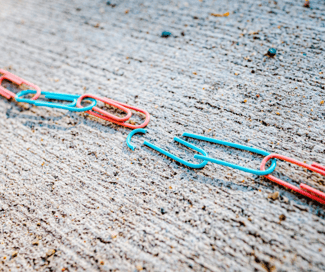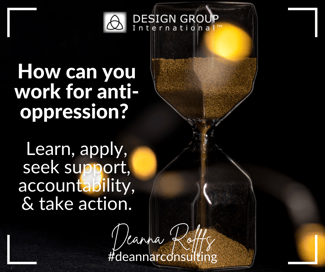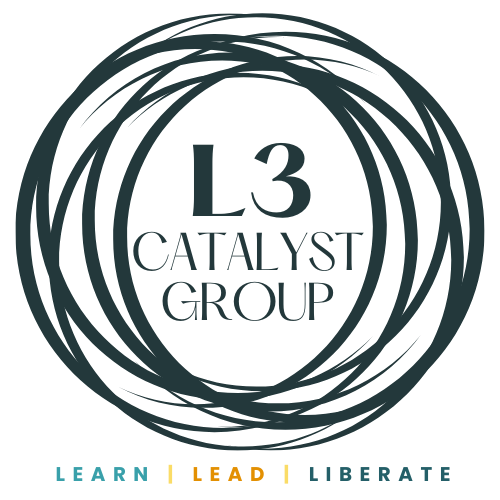How do you define your purpose in this world? The reason you walk this earth? The thing that gets you out of bed in the morning and is the fire in your belly?
The way I describe my purpose has changed quite a lot since my twenties, when I was a social worker supporting women experiencing homelessness. Then, I would say “I want to help people.” Over the years it’s morphed significantly. Now I say something like:
“I want to use my power for good instead of evil. I work at the intersection of leadership development, organizational theory and anti-oppression. I want to be a force for justice.”
Or perhaps
“I want to work with brave leaders, working for justice to build bridges and break apart inequitable mindsets, relationships, organizations and systems.”
I’m learning, growing, and changing. Instead of getting the perfect description, I'm embracing what I'm learning as my why develops.
 I used to focus internally, on myself: helping, supporting, and change-making. Then I talked about teams: awareness, vulnerability, effectiveness, and growth.
I used to focus internally, on myself: helping, supporting, and change-making. Then I talked about teams: awareness, vulnerability, effectiveness, and growth.
Then I expanded my focus to systems: bravery, solidarity, liberation, and decentering myself/those with power and privilege.
Now I talk about anti-oppression and justice.
When we talk about anti-oppression, it’s important that I get clear first on what we mean by oppression and why it matters.
“Oppression is the use of power to disempower, marginalize, silence, or otherwise subordinate one social group or category, often in order to further empower and/or privilege the oppressor. Social oppression may not require formally established organizational support to achieve its desired effect; it may be applied on a more informal, yet more focused, individual basis.” (The Anti-Oppression Network, What is Anti-Oppression?)
Anti-oppression matters precisely because dominant narratives in the United States work to convince us that oppression doesn’t exist, and it sounds like this:
- You can become anything you want
- The sky is the limit
- They are self-made
- Pull yourself up by your bootstraps
- They don’t have wealth because they don’t work hard
"The Anti-Oppression Network seeks to recognize the oppression that exist in our society and attempts to mitigate its effects and eventually equalize the power imbalance in our communities.
 There are certain groups in our society and communities that hold power over others based on their membership in those groups. For example, if you were to look at the demographics of the CEOs of any major corporation, city council, parliament, etc. you would notice that most if not all of these positions of great power are populated by white (publicly straight) males. On the flip side, if you were to look at the demographics of janitorial staff or fast food workers you might notice that these positions are populated largely by persons of colour, specifically women of colour. When studying the statistics of those receiving social assistance, or state aid, you would also notice that the vast majority of those in our communities living in this poverty are folks with disabilities and the elderly." - The Anti-Oppression Network
There are certain groups in our society and communities that hold power over others based on their membership in those groups. For example, if you were to look at the demographics of the CEOs of any major corporation, city council, parliament, etc. you would notice that most if not all of these positions of great power are populated by white (publicly straight) males. On the flip side, if you were to look at the demographics of janitorial staff or fast food workers you might notice that these positions are populated largely by persons of colour, specifically women of colour. When studying the statistics of those receiving social assistance, or state aid, you would also notice that the vast majority of those in our communities living in this poverty are folks with disabilities and the elderly." - The Anti-Oppression Network
You may ask how you, too, can work for anti-oppression. In short: learn, apply, seek support, accountability, and action. This Desmond Tutu quote lights a fire in me:
“If you are neutral in situations of injustice, you have chosen the side of the oppressor.”
 Do you have to consider yourself an oppressor to be one? Nope. Systems of oppression exist by convincing people that they don’t exist, and power is a critical component. I’m sometimes told that talk of systemic oppression is a liberal ploy, that we live in a post-racial society, that slavery was ended so we’re fine now, and that surely racism isn’t a thing now, because–look at Oprah or President Obama! We’re given singular examples of success to cancel out systemic issues.
Do you have to consider yourself an oppressor to be one? Nope. Systems of oppression exist by convincing people that they don’t exist, and power is a critical component. I’m sometimes told that talk of systemic oppression is a liberal ploy, that we live in a post-racial society, that slavery was ended so we’re fine now, and that surely racism isn’t a thing now, because–look at Oprah or President Obama! We’re given singular examples of success to cancel out systemic issues.
As we talked about last time, understanding racism and oppression as white people is a lifelong journey without a finish line or a tidy checklist. It requires constant curiosity, growth, and urgency.
My commitments are flawed and include many mistakes. I don’t expect you to unpack any of this flawlessly either. But we dust ourselves off, and keep trying, learning, leading, and working for anti-oppression.
What are you learning about anti-oppression and how are you leading in these commitments? In what ways are you stuck? I’d love to hear about it.
Fellow leaders and learners, I wish you courage and resilience for the journey.
Peace to you,

Read parts one and two of this series here:
- Let's talk about whiteness - Part 1: Who are you, white person, to work for racial equity?
- Let's talk about whiteness - Part 2: You always talk about race; do you hate white people?

What I’m Reading & Watching
Regarding This Topic:
- Social Identities And Systems Of Oppression from The Smithsonian
- What is Oppression? from The Anti-Oppression Network
- How to understand power by Eric Liu on TedED

Questions for Consideration
Regarding This Topic:
- What are you learning about anti-oppression and how are you leading in these commitments? In what ways are you stuck? What do you do when you get stuck?
- What forms of oppression show up in your personal or professional spaces? How do you grapple with your privilege and marginalized identities?
- In what ways do you live out your anti-oppressive commitments?
- How do components of your identity, whether they bring power or marginalization, impact your anti-oppression commitments to learning, accountability, action and liberation?
- How do you describe your personal and professional purpose? How has it changed over time?

Upcoming
Leadership & Learning Topics:
- Why is consciousness about my whiteness integral to...everything?
- How can you say white fragility is violent?
- White privilege, are we still debating this?
- How does whiteness apply to patriarchy and misogyny?
- Isn't intersectionality just the presence of difference?
- Why isn’t reverse racism a thing?

August 25, 2021




Comments